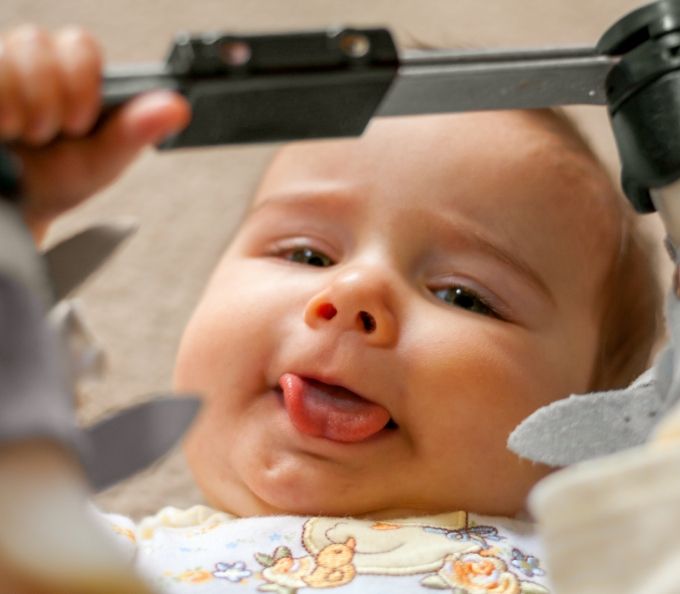Lip-Ties Southampton
Experiencing Problems with Lip Movement? We Can Help
A lip-tie can be a much more severe problem than many people realize. Oftentimes, the condition can interfere with breastfeeding, and it can cause further issues later in life if it isn’t properly treated. At Philadelphia Tongue and Lip Tie Center, we can help anyone – no matter what age they are – who may be struggling with a lip-tie. If one of your loved ones has a lip-tie, don’t hesitate to pick up the phone and call us to learn what treatment options are available.
Why Choose Philadelphia Tongue and Lip Tie Center for Lip-Tie Treatment?
- Quick, Gentle Laser Frenectomies
- Patients of All Ages Welcome
- Experienced Dental Expert
What Is a Lip-Tie?

Have you noticed the band of tissue that connects your lips to your gums? Said tissue is known as the frenulum, and under normal circumstances, it helps keep the lips stable. However, if the frenulum is too short or too tight, it can stop the lips from moving the way that they should, thus resulting in a lip-tie. The restricted lip movement can lead to many consequences and can be particularly problematic for children who are still breastfeeding.
What Are the Signs of a Lip-Tie?

Infants with lip-ties tend to have trouble latching on when breastfeeding, and they sometimes make clicking sounds when trying to nurse. Additionally, breastfeeding mothers may experience discomfort after feeding sessions. In older children and adults, lip-ties may result in front teeth that are spaced unusually far apart as well as gum recession. To know for sure whether someone in your family has a lip-tie, you should schedule a consultation with our team.
Why Is It Important to Treat a Lip-Tie?

If your child has a lip-tie, ignoring the problem could have serious consequences for their development, especially if it’s preventing them from breastfeeding properly. On top of that, people with lip-ties may have trouble brushing or flossing their teeth, leaving them more likely to develop cavities. Having a lip-tie treated can significantly improve a person’s health in many ways, which is why it’s best to take swift action to have the problem addressed by a professional.
Lip-Tie FAQs
Does a Frenectomy Hurt?
While performing traditional frenectomies requires local anesthetics, we offer advanced laser frenectomies that involve minimal discomfort and can often be completed without anesthetic treatments. The laser we use is so precise that it only targets the excess tissue while cauterizing the wound as we go along, thereby preventing much discomfort and bleeding. However, a local anesthetic may be necessary if the excess tissue is especially thick. In any case, we will do everything we can to ensure that your child is comfortable.
Is My Child Old Enough to Get Lip-Tie Treatment?
While it’s understandable that you might be worried about your little one going through a procedure, there is no minimum age for having a lip-tie treated. It can even be performed a few days after birth if necessary. Sadly, it is not good enough to assume that a lip-tie will go away on its own, and addressing the matter sooner can greatly improve your child’s oral function and breastfeeding ability. This can bring major benefits to their quality of life as an adult.
How Long Does a Frenectomy Take?
We use a soft tissue laser that allows us to complete a frenectomy in a few minutes. However, the treatment can take longer if the frenulum is especially thick. During your consultation, we will go over the details of the procedure so you can have a more detailed idea of how long it can take.
Can I Be in the Room During My Child’s Frenectomy?
We don’t usually allow parents or guardians in the room during a frenectomy, as the procedure can be difficult for some people to watch. A distressed or squeamish parent can distract the dental team that is supposed to focus exclusively on the patient, so keeping the room clear allows us to give our best efforts to the child. We’ll call you to see your little one as soon as the procedure is complete.
What Could Happen If My Child Doesn’t Get Treatment for a Lip-Tie?
An untreated restrictive lip-tie can make it much more difficult for a child to thrive. The issue can prevent your child from feeding at the breast or bottle normally, resulting in poor weight gain that can lead to negative long-term consequences. As your child gets older, an untreated lip-tie can create issues when they attempt to eat solid foods or speak clearly. The problem can eventually lead to issues in adulthood such as sleep apnea, neck and shoulder pain, poor oral health, and others.
